Frutti di Mare (Italian Seafood Pasta
Updated Jun 20, 2025, Published Nov 05, 2020
This post may contain affiliate links. Please read our disclosure policy.
This Frutti di Mare Recipe is a fancy Italian seafood pasta dish that is surprisingly simple to make. It’s our family recipe straight from the Mediterranean shores of Sardegna and on the menu often at our Italian table. It makes a wonderful summer seafood pasta, working well for a special occasion or simple for a night at home with the family.
Try our pasta with clams recipe next time!
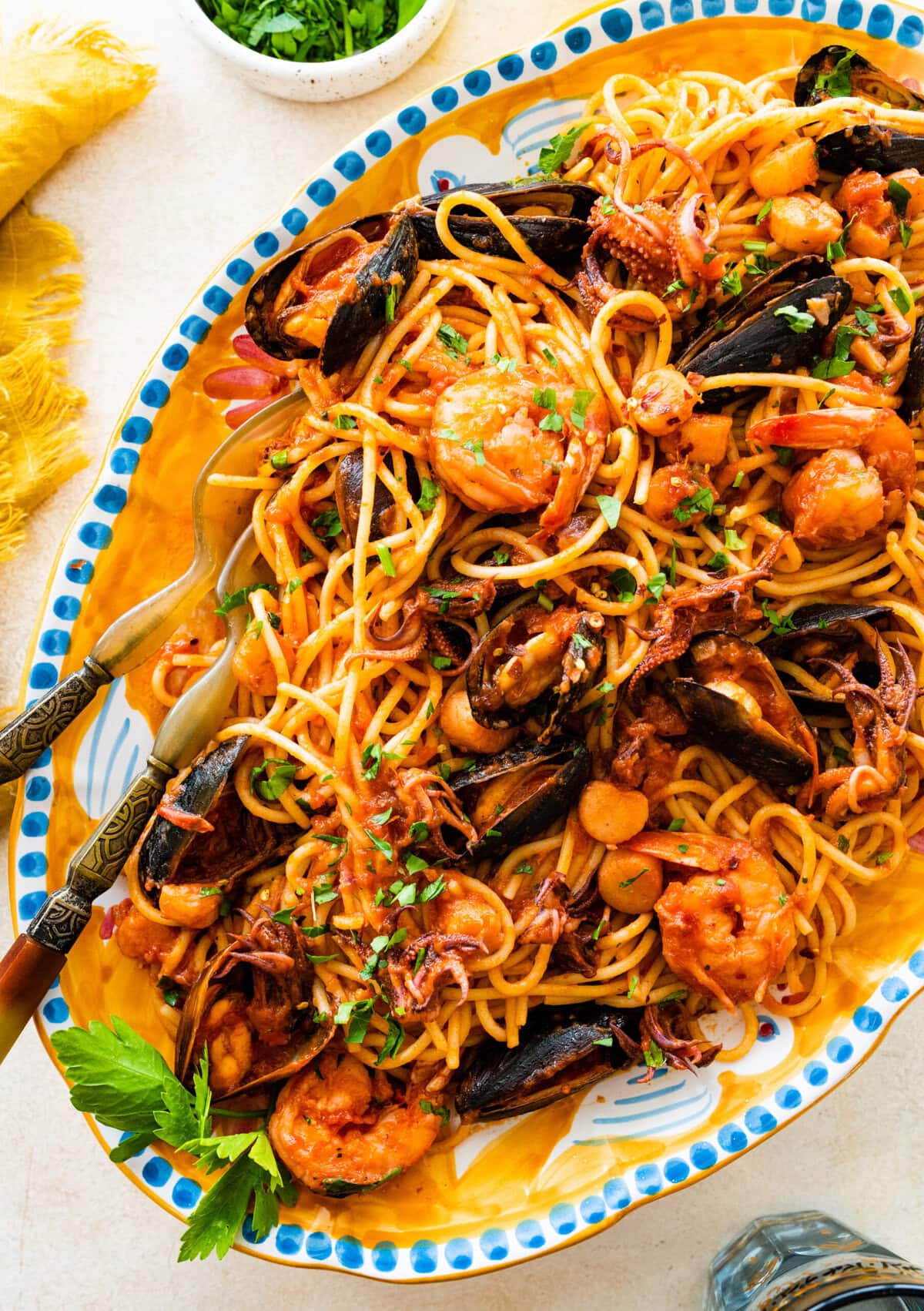
Why you’ll love this family favorite!

Fresh seafood brings me back to the summer air of the Mediterranean. Every bite is a memory, transporting me to Italy even when I am hundreds of miles away.
Bring this Italian seafood pasta to your table and enjoy the rich tomato sauce and delicious taste of the sea! .
More seafood recipes I think you will love are this Pasta with Tomato Sauce and Shrimp, and this simple Orzo Pasta with Shrimp.
Made With AmorE,

Table of Contents
Recipe Ingredients
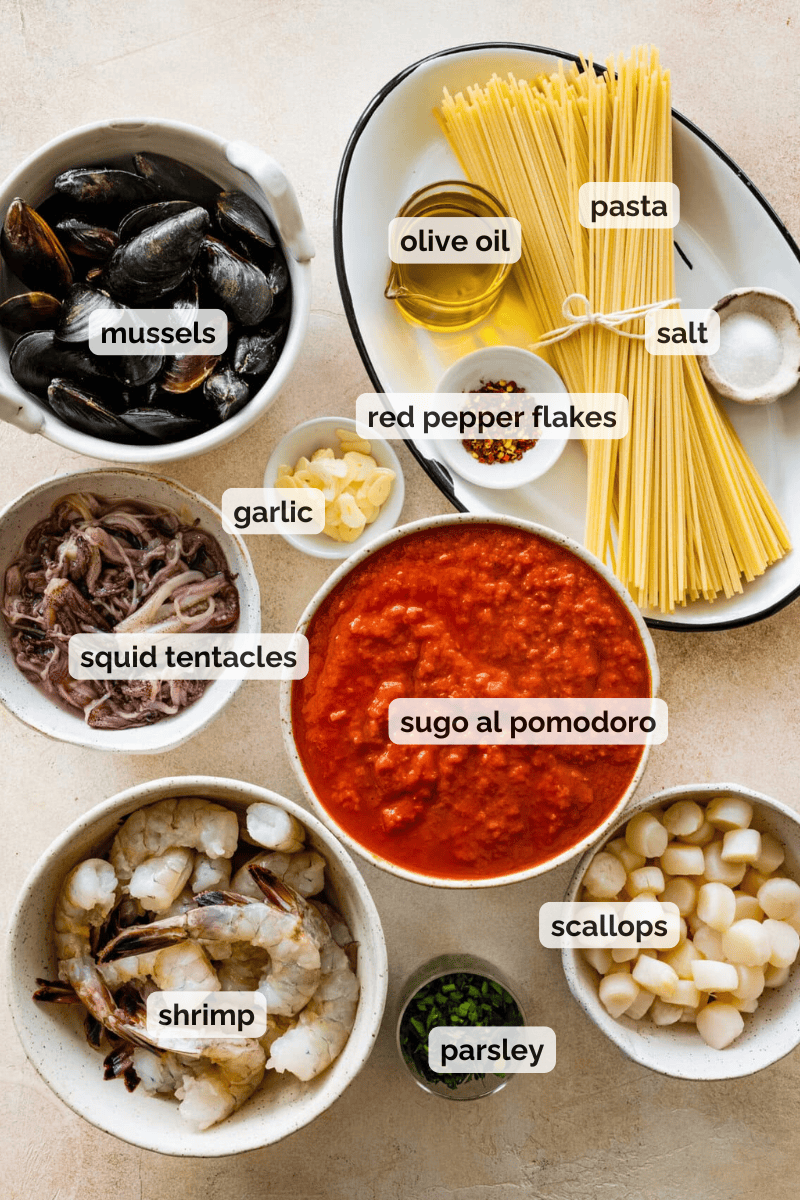
- Pasta: For seafood pasta, I recommend long pasta such as spaghetti, linguini, or even homemade pappardelle.
- Seafood: Mussels, shrimp, squid tentacles, and baby scallops are the seafoods I like to include, but feel free to mix it up and add your own.
- Sauce: A classic spaghetti frutti di mare recipe cooks the seafood in a thick red tomato sauce. I prefer to make up a batch of my sugo al pomodoro in advance, but you can opt for a good store-bought marinara sauce to save some time.
See recipe card for the full list of ingredients and quantities of each one.
Variations
- Add a bit of wine: Add a splash of dry white wine like sauvignon blanc or pinot grigio to the mussels as they steam to add a little more flavor to the broth.
- Try different seafoods: There’s lots of flexibility here for the seafood you choose. Replace half or all of the mussels with baby clams, and feel free to leave out any seafood you don’t care for and replace it with more of another.
You will also love this shrimp pasta, stuffed clams, or this pasta with clams.
“This seafood pasta is authentic and delicious!!”
– J.D.
How to Make Frutti di Mare
The process is fairly simple! Once you’ve made it, you’ll want to share it with all your friends and family.

- Heat the olive oil and garlic in a large skillet over medium heat. Stir quickly and do not to burn the garlic. Add the mussels and toss with a wooden spoon. Cook for about a minute or until they begin to open.

- Add the shrimp to the pan with the mussels and give it a stir. Cover and cook for another minute or so. Once all the mussels open and the shrimp is almost cooked, add the squid tentacles. Cook another minute or so until they curl up. Add the baby scallops and cook for about 1-2 minutes more.
Cooking Seafood Tip
Most importantly, we do not want to overcook the seafood. Since all the seafood ingredients in this recipe cook at different rates, the key is to add them to the dish in the order listed to avoid overcooking. Mussels take the longest (usually 3-4 minutes), which is why they cook first. Shrimp, scallops, and squid will all take about 2-3 minutes.

- Warm up the tomato sauce in a saucepan. When heated, pour the sauce over the seafood.

- Toss the sauce gently with the seafood, set it aside, and cook your pasta. The best way to cook pasta is to bring a large pot of salted water to a boil. Add the pasta to the pot and cook until al dente. Drain and reserve 1 cup pasta water.

- Add the pasta to the pan of seafood in red sauce.

- Toss to coat the pasta in the seafood pasta sauce. Add a little bit of the reserved pasta water if needed. Transfer your seafood spaghetti to a serving platter, drizzle with some olive oil and sprinkle with the parsley. Eat hot and enjoy!

My Pro Tips
Recipe Tips
- Buying Seafood. Make sure you buy the freshest seafood possible from a reliable source for this frutti di mare pasta dish. When buying mussels, look for ones with tightly closed shells. They should smell fresh and briny, like the ocean. Ask your fishmonger to pack the shellfish on ice.
- Store Seafood Before Cooking. Transfer all the seafood to a breathable (not airtight) container when you get home, and cover it with a damp dishtowel or paper towel and storing it in the fridge until you’re ready to cook.
- Purge the Mussels. This must be done at least 2 hours before cooking and is key to removing any grit or sand on the mussels. To start, soak them in saltwater for 20-30 minutes, and then rinse. You can repeat more than once if you feel the first soak doesn’t work. At this point, you also want to discard any mussels that are open or have broken shells.
- Don’t overcook the seafood. These are delicate proteins and can overcook and turn rubbery very quickly! Be sure to add them to the skillet in the order the recipe is written.

Italian Seafood Pasta Recipe FAQs
There is often a very heated debate over whether or not to add cheese to seafood pasta. I am a purest on the subject- just no! I love creativity and mixing up traditional dishes, but not when it comes to mixing seafood and parmigiano.
Without cheese the taste of the sea really comes through.
To store any leftovers, pack them in an airtight plastic container and store them in the fridge for up to 3 days. You can add olive oil to prevent the pasta from sticking to the container. Remember, seafood is best eaten fresh!
For this recipe, high-quality, fresh seafood is definitely the best since they are the star of the show. But frozen seafood is a convenient option, especially if fresh seafood isn’t available where you live. Most important, thaw it out before cooking and make sure to drain it of any excess liquid. Avoid using pre-cooked seafood, and frozen seafood may be more delicate so be sure you cook just until it’s done and not any longer.
Frutti di mare is a versatile dish, so feel free to use the seafood you love or have on hand. If you don’t have clams or mussels, scallops or chunks of lobster tail are delicious substitutes. You can also add crab meat or firm white fish like cod for variety. Octopus is another great option if it’s pre-cooked or tender. The key is to keep the balance of flavors and not overcrowd the sauce—let each seafood shine!
Serving Suggestions
This spaghetti frutti di mare recipe is the perfect way to enjoy fresh seafood. It’s easy enough for a weeknight dinner but equally impressive to serve to guests the next time you host a dinner party. Serve it with simple sides like this sweet and savory pear and gorgonzola salad or this Italian orange and fennel salad. Don’t forget some Italian bread to sop up all the sauce!
Serve up a seafood feast for dinner and enjoy other favorites like this Italian seafood salad, crab cakes without egg, and crispy calamari.

More Seafood Pasta Recipes
💙 MADE THIS RECIPE AND LOVED IT? 💙 Please leave a ⭐️STAR rating and COMMENT below- I love connecting with you! Tag me with your creations on Instagram and find me on Pinterest.
Frutti di Mare Recipe (Seafood Pasta)

Ingredients
- 1 pound mussels , cleaned well
- 1 pound wild shrimp , peeled and devined
- ½ pound squid tentacles
- ½ pound baby scallops
- ¼ cup extra virgin olive oil
- 3 cloves garlic , sliced
- 1 teaspoon red pepper flakes + more to taste
- ⅓ cup fresh chopped Italian parsley
- ¾ pound spaghetti
- 1 batch sugo al pomodoro, made in advance
- sea salt to taste
- fresh parsley , chopped (for garnish)
- Crusty bread for serving
Instructions
- Heat a large skillet or large cast iron pot on medium heat. Add olive oil and garlic. Stir garlic for about 1 minute until fragrant. Add the mussels and toss with a wooden spoon. Cook with the lid on for about 2 minutes (or until the mussels open).
- Add the shrimp to the pan with the mussels and give it a stir. Cover and cook for another minute or so. The key is not to overcook the seafood.
- Once all the mussels open and the shrimp are almost cooked, add the squid tentacles. Cook another minute or so until they curl up. Add the baby scallops and cook for about 1-2 minutes more.
- Warm up the sugo al pomodoro sauce in a saucepan. Pour the sauce over the seafood and toss gently. Let it simmer for about 10-15 minutes on low heat.
- Bring a large pot of salted water to a boil. Cook the pasta according to the package directions until al dente. Drain and reserve 1 cup pasta water. Add
- Add the cooked pasta to the pan with the seafood and toss to coat in the sauce. Let the sauce and pasta marry together in the pot for a few minutes. Add a little bit of the reserved pasta water, if needed. Garnish with fresh chopped parsley. Optional: red pepper flakes for garnish. Transfer to a serving platter and serve hot!
Notes
- Buying Seafood. Choose the freshest seafood from a trusted source. Mussels should have tightly closed shells and smell like the sea. Ask your fishmonger to pack them on ice.
- Store Seafood Before Cooking. Once home, transfer seafood to a breathable container and cover with a damp towel. Keep refrigerated until ready to use.
- Purge the Mussels. At least 2 hours before cooking, soak mussels in saltwater for 20–30 minutes, then rinse. Repeat if needed. Discard any open or broken ones.
- Don’t Overcook the Seafood. Seafood is delicate and can turn rubbery fast. Add it to the skillet in the order listed in the recipe for best results.
Nutrition
Nutrition information is automatically calculated, so should only be used as an approximation.
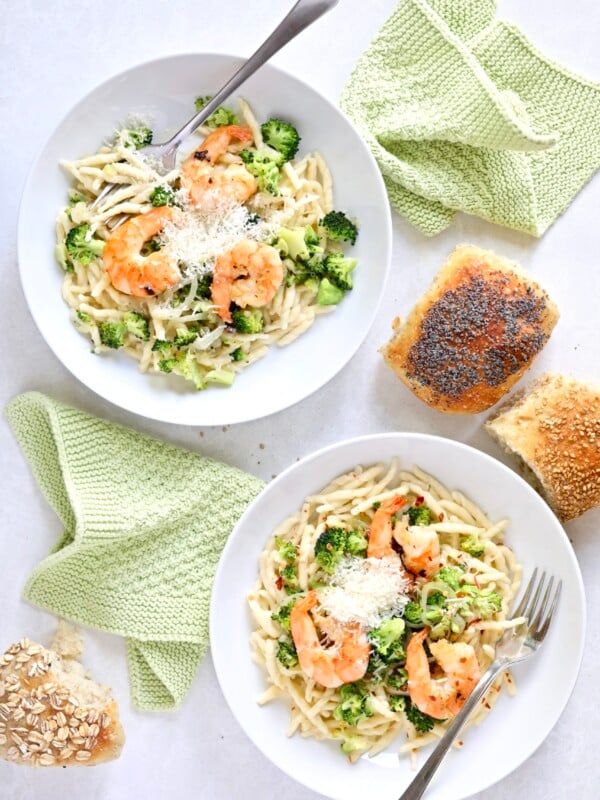
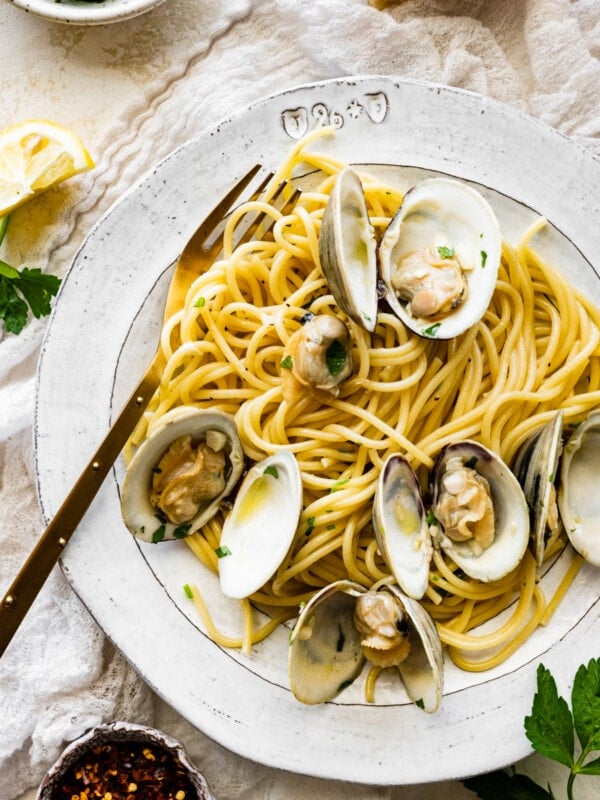
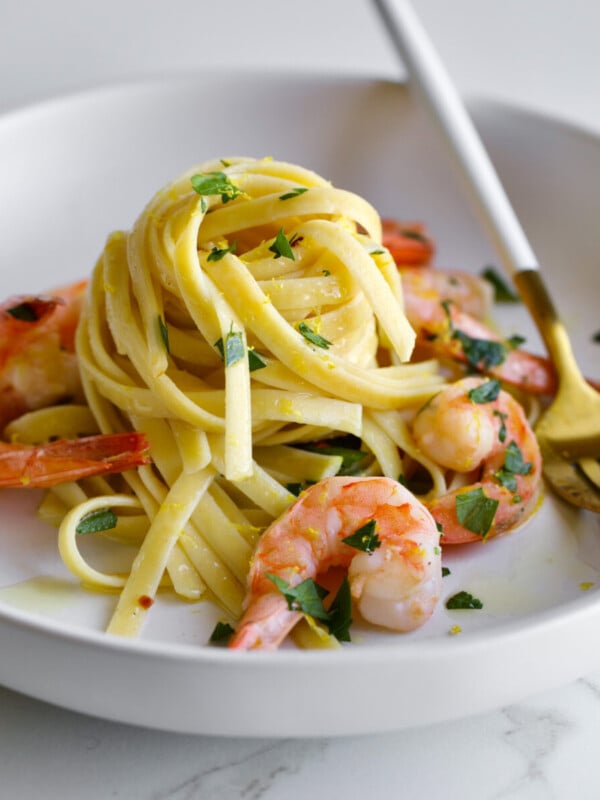
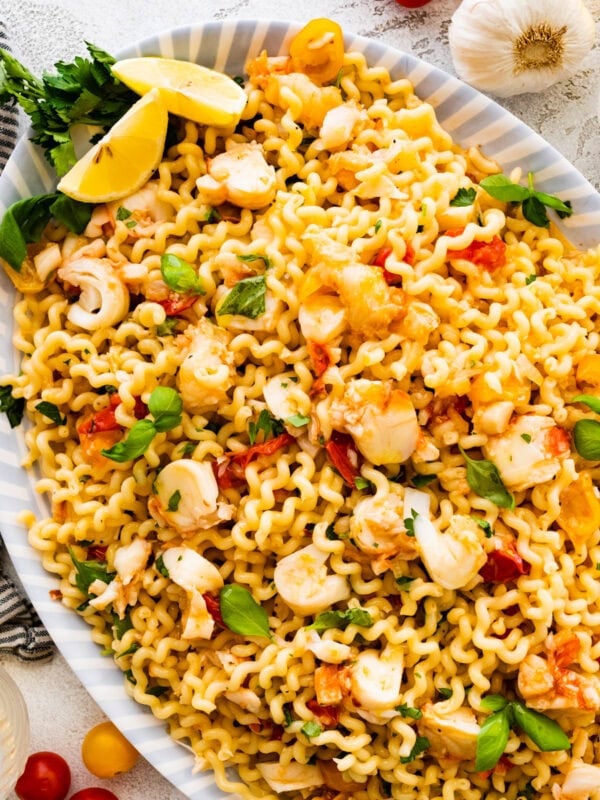
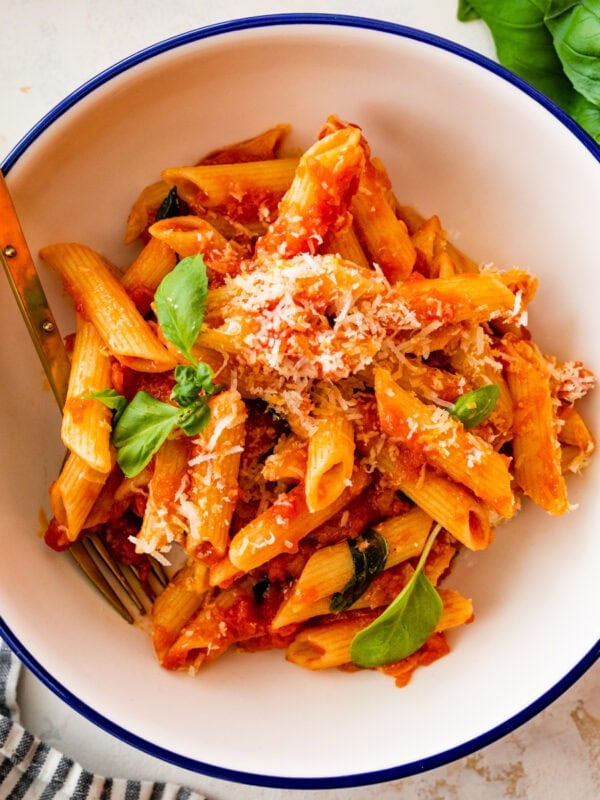
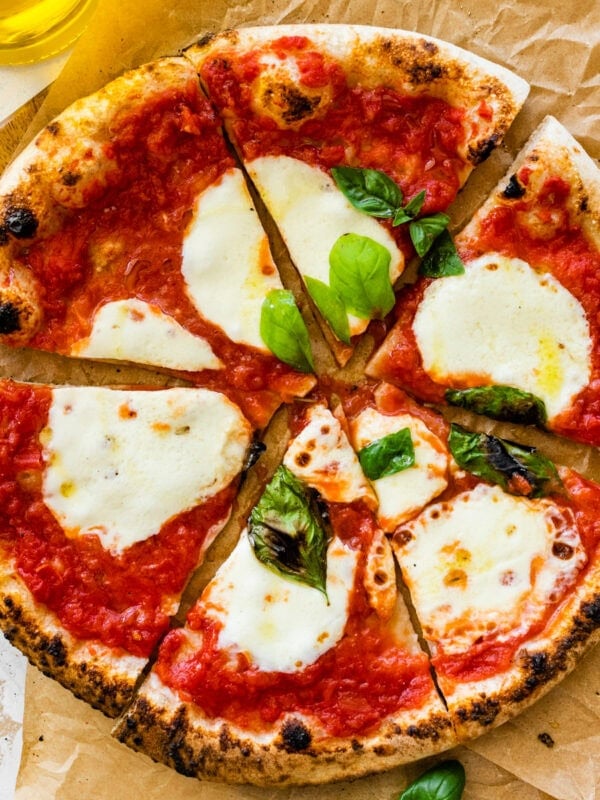

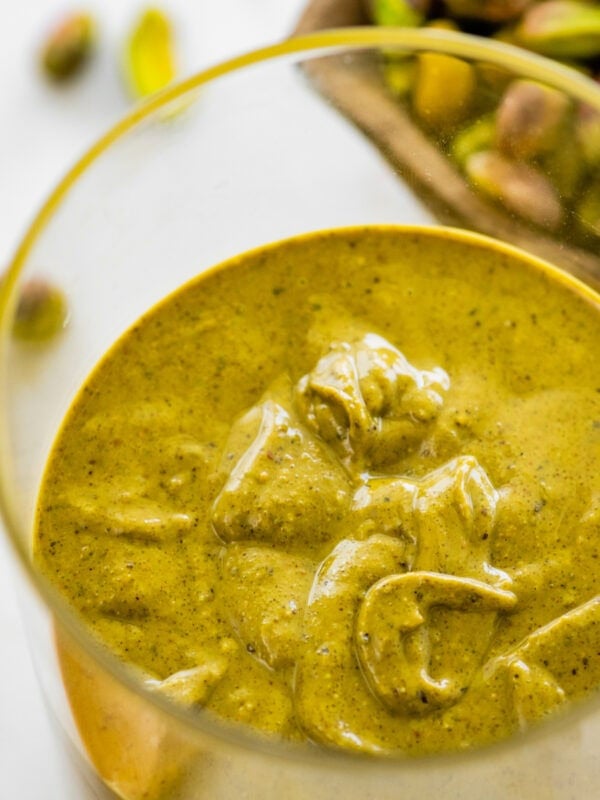




This is one of my favorite pasta dishes of all time! So flavorful and delicious.
This seafood pasta is authentic and delicious!!
This is a recipe for success, – but the difference between good and great really depends on the ingredients. It has happened a few times that fresh mussels we bought had a “muddy” taste, while the frozen mussels we have tried have been excellent. The take-home message for me has been to try the recipe a few times to find the best ingredients.
I completely agree the quality of ingredients truly matter in making this “restaurant worthy” seafood pasta dish.